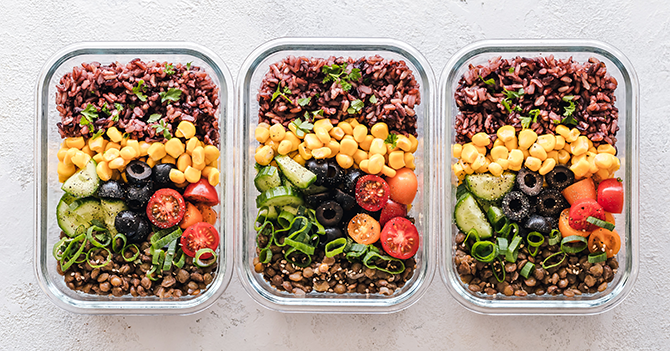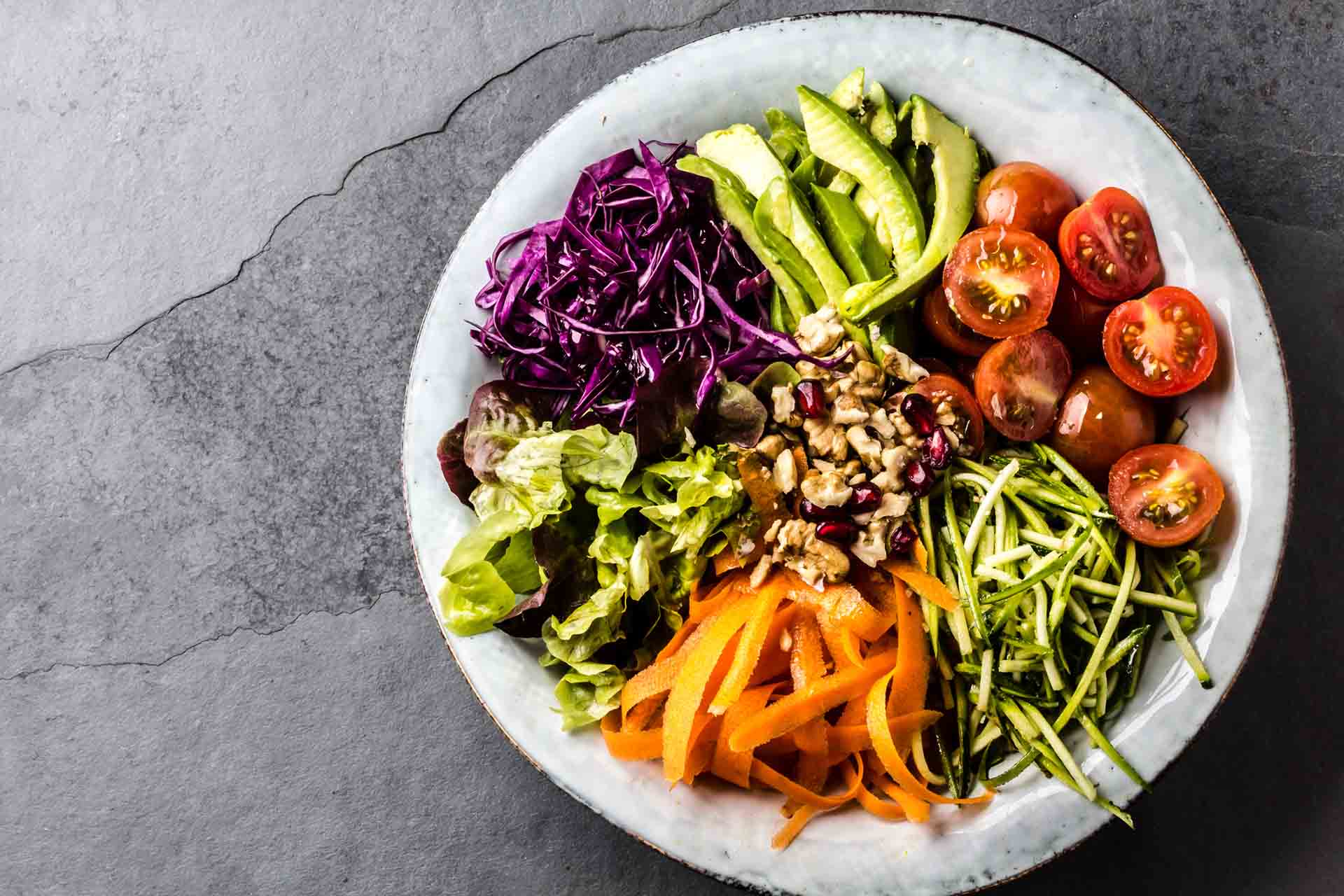Mouthwatering BBQ Sauces That Pair Perfectly with Vegan Proteins
Mouthwatering BBQ Sauces That Pair Perfectly with Vegan Proteins
Blog Article
Everything About Healthy And Balanced Food: Benefits of Checking Out Plant Based Alternatives
The discussion bordering plant-based diet plans has gained significant focus recently. Lots of individuals are exploring the possible wellness advantages, nutritional benefits, and ecological influences connected with these dietary selections. As people become more knowledgeable about their food's impact on health and sustainability, inquiries emerge concerning the usefulness of embracing such a way of life. What specific changes can one expect, and exactly how might these choices improve not only personal wellness yet also the earth's future?
Understanding Plant-Based Diet Regimens
Numerous people connect plant-based diet plans mainly with vegetarianism or veganism, these diet plans can include a wide range of eating patterns that prioritize entire, minimally refined plant foods. Such diet plans commonly consist of fruits, vegetables, entire grains, legumes, nuts, and seeds, while eliminating or restricting animal products. This flexibility enables individuals to customize their dietary selections according to nutritional requirements and personal preferences. Some might take on a mostly plant-based diet while still sometimes consuming meat or dairy products, often referred to as a flexitarian technique. The focus stays on integrating even more plant foods, which can cause a varied array of dishes and tastes. Recognizing these different interpretations of plant-based eating is crucial for valuing its availability and charm in modern food culture.
Health And Wellness Perks of Plant-Based Foods
The wellness advantages of plant-based foods are significant, using a nutrient thickness benefit that sustains general health. Study suggests that these foods can improve heart wellness and play an important role in effective weight management. By integrating much more plant-based alternatives, people may enhance their nutritional options and promote long-term wellness.
Nutrient Thickness Benefit
Nutrient density plays an important role in the health and wellness advantages of plant-based foods, making them an engaging choice for those seeking a well balanced diet plan. Plant-based foods, such as fruits, vegetables, vegetables, nuts, and whole grains, are often rich in essential vitamins, minerals, and antioxidants while being lower in calories. This high nutrient thickness enables people to eat less calories while still fulfilling their dietary requirements. In addition, these foods are packed with dietary fiber, promoting digestive system health and wellness and assisting in weight monitoring. By integrating nutrient-dense plant-based choices, customers can boost their total health, support their body immune systems, and lower the danger of persistent diseases. Ultimately, the nutrient thickness of plant-based foods emphasizes their relevance in a health-conscious lifestyle.
Heart Health And Wellness Renovation

Weight Administration Support
Along with advertising heart health and wellness, a plant-based diet plan can considerably assist in weight administration. This nutritional method emphasizes entire foods such as fruits, veggies, legumes, nuts, and whole grains, which are normally lower in calories and higher in fiber contrasted to animal-based items. The high fiber material helps raise satiety, minimizing total calorie intake. Additionally, plant-based diets are often abundant in crucial nutrients while low in undesirable fats, making it much easier to maintain a healthy and balanced weight. Plant Based Beef. Study shows that individuals that take on a plant-based lifestyle often tend to have reduced body mass indexes (BMIs) and experience even more successful weight loss contrasted to those who eat meat-heavy diets. Welcoming plant-based alternatives is a tactical option for reliable weight management.
Nutritional Value of Plant-Based Active Ingredients
Plant-based active ingredients are rich in vital nutrients, supplying a varied selection of vitamins, minerals, and antioxidants that add to general health. A contrast of protein sources reveals that while pet products are typically considered as premium, many plant-based choices supply appropriate protein official statement and other useful compounds. Recognizing the dietary worth of these components can help people make educated dietary choices.
Necessary Nutrients in Plants
Nutrient-rich components discovered in plants supply a varied variety of crucial vitamins and minerals that add greatly to overall wellness. These ingredients are abundant in vitamins A, C, and K, which sustain immune feature, vision, and blood clot, respectively. Additionally, plants supply vital minerals such as magnesium, potassium, and calcium, critical for heart health, muscle mass function, and bone strength. The presence of fiber in plant-based foods help food digestion and promotes a healthy intestine microbiome. Antioxidants, discovered generously in fruits and vegetables, aid fight oxidative stress and anxiety and decrease inflammation. Many plant foods are low in calories yet high in nutrients, making them an outstanding selection for those seeking to maintain a healthy and balanced weight while guaranteeing ideal nutrient intake.

Comparing Healthy Protein Sources
Protein resources vary substantially in their dietary profiles, with plant-based active ingredients providing distinct benefits. Unlike animal proteins, which frequently consist of hydrogenated fats and cholesterol, plant healthy proteins often tend to be reduced in these harmful components. Legumes, nuts, seeds, and entire grains are rich in vital amino acids, fiber, vitamins, and minerals. For circumstances, lentils supply high healthy protein content together with substantial iron and folate, while quinoa is a complete healthy protein, offering all 9 necessary amino acids. Furthermore, plant-based healthy proteins are usually gone along with by anti-oxidants and phytochemicals that support general health and wellness. The shift to plant-based healthy protein sources not just improves nutritional consumption however likewise aligns with lasting dietary techniques, lowering ecological influence and advertising lasting health and wellness advantages.
Ecological Influence of Plant-Based Consuming
As understanding of climate change expands, many individuals are discovering lasting dietary options that can greatly reduce their environmental footprint. Plant-based consuming has actually emerged as a considerable contributor to minimizing greenhouse gas discharges, which are mostly connected with animals production. The growing of fruits, vegetables, grains, and veggies typically calls for less sources, such as water and land, contrasted to pet farming. In addition, plant-based diet regimens can result in reduced deforestation, as much less land is needed for grazing livestock or expanding pet feed. By changing towards plant-based alternatives, consumers can sustain biodiversity and promote much healthier environments. In general, welcoming plant-based consuming not just advantages individual health however likewise stands for an important action toward ecological sustainability and preservation initiatives.
Conquering Common Misconceptions
While several individuals acknowledge the benefits of a plant-based diet regimen, several mistaken beliefs frequently prevent them from completely welcoming this lifestyle. A typical idea is that plant-based diets do not have enough healthy protein; nonetheless, countless plant resources, such as vegetables, nuts, and tofu, supply adequate protein. Additionally, some presume that this diet plan is expensive, when in reality, staples like beans, rice, and seasonal vegetables can be rather affordable. Another false impression is that plant-based eating is overly limiting, whereas it really offers a diverse selection of foods and flavors. Numerous fret that a plant-based diet might lead to shortages, yet with appropriate planning, people can acquire all necessary nutrients, including vitamins and minerals, while enjoying a large selection of scrumptious meals. Large Tips for Transitioning to a Plant-Based Way of life
Making the shift to a plant-based lifestyle can be an enriching experience, though it typically requires some assistance to browse the preliminary changes. People are motivated to start gradually, integrating more fruits, veggies, legumes, and entire grains into their meals while minimizing meat and dairy products usage. Dish planning is necessary; preparing a weekly food selection can assist ease the modification and avoid last-minute unhealthy options. Exploring cooking methods and brand-new dishes can also boost the experience and preserve excitement concerning plant-based consuming. In addition, joining support system or communities can supply motivation and share valuable pointers. Staying informed concerning nourishment warranties well balanced dishes, protecting against deficiencies while promoting a healthy and balanced, enjoyable plant-based way of living.

Delicious Plant-Based Meal Ideas
Discovering delicious plant-based meal ideas can influence people to welcome a more nourishing diet. One popular option is a hearty quinoa salad, including cherry tomatoes, cucumber, and a tangy lemon-tahini clothing. Another favorite is a full-flavored lentil stew, packed with carrots, celery, and aromatic herbs, excellent for a reassuring dinner. For breakfast, overnight oats made with almond milk, chia seeds, and topped with fresh berries give a healthy begin to the day. Additionally, a dynamic vegetable stir-fry with tofu and a variety of colorful veggies can be a fast yet pleasing meal. Finally, creamy avocado salute on whole-grain bread, sprayed with seeds and seasonings, uses a basic yet savory snack. These meals display the selection and richness of plant-based consuming.

Frequently Asked Inquiries
Can a Plant-Based Diet Regimen Give Sufficient Protein?
The question of whether a plant-based diet regimen More Help can provide enough protein prevails. Countless sources, consisting of beans, nuts, seeds, and whole grains, can fulfill protein requires properly, sustaining a nourishing and balanced diet plan for individuals.
Are Plant-Based Diets Appropriate for Children?
The viability of plant-based diet regimens for children depends upon careful planning. Appropriate nutrients should be assured, including proteins, vitamins, and minerals. With proper advice, such diet plans can support healthy and balanced development and advancement in children.
How Do I Eat in restaurants on a Plant-Based Diet?
Dining out on a plant-based diet involves looking for restaurants with diverse food selections, requesting for modifications, and checking out vegan-friendly choices. Preparation in advance and connecting nutritional preferences can improve the dining experience while maintaining nutritional selections.
What Are Common Allergens in Plant-Based Foods?
Typical allergens in plant-based foods consist of soy, gluten, nuts, and seeds - Sugar Free Sauces. Individuals following a plant-based diet plan needs to understand these allergens and review labels carefully to prevent damaging responses and ensure safe usage
Can Plant-Based Diets Assist With Weight-loss?
Study suggests that taking on a plant-based diet plan may assist in weight reduction as a result of its commonly reduced calorie thickness and greater fiber material. This mix can boost satiation, aiding individuals handle their calorie intake effectively. Lots of individuals associate plant-based diet plans Discover More Here mainly with vegetarianism or veganism, these diet regimens can encompass a wide array of consuming patterns that prioritize entire, minimally processed plant foods. Nutrient thickness plays a crucial role in the health benefits of plant-based foods, making them an engaging choice for those looking for a balanced diet. Plant-based diet regimens have actually been shown to markedly improve heart health and wellness, as they frequently include components that support cardio function. In enhancement to advertising heart wellness, a plant-based diet can considerably help in weight administration. A common belief is that plant-based diets do not have enough protein; however, many plant sources, such as legumes, nuts, and tofu, give adequate protein.
Report this page